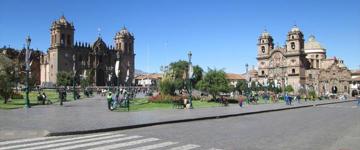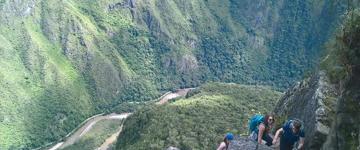Machu Picchu
Often referred to as "The Lost City of the Incas", Machu Picchu is one of the most familiar symbols of the Inca Empire.
It is a pre-Columbian Inca site located 2,430 metres (8,000 ft) above sea level[1]. It is situated on a mountain ridge above the Urubamba Valley in Peru, which is 80 kilometres (50 mi) northwest of Cuzco and through which the Urubamba River flows.
The Incas started building it around AD 1430 but was abandoned as an official site for the Inca rulers a hundred years later at the time of the Spanish conquest of the Inca Empire. Although known locally, it was largely unknown to the outside world before being brought to international attention in 1911 by Hiram Bingham, an American historian. Since then, Machu Picchu has become an important tourist attraction.
Machu Picchu was declared a Peruvian Historical Sanctuary in 1981 and a UNESCO World Heritage Site in 1983. Since it was not plundered by the Spanish when they conquered the Incas, it is especially important as a cultural site and is considered a sacred place.
Machu Picchu was built in the classical Inca style, with polished dry-stone walls. Its primary buildings are the Intihuatana, the Temple of the Sun, and the Room of the Three Windows. These are located in what is known by archaeologists as the Sacred District of Machu Picchu. In September 2007, Peru and Yale University reached an agreement regarding the return of artifacts which Hiram Bingham had removed from Machu Picchu in the early twentieth century.


